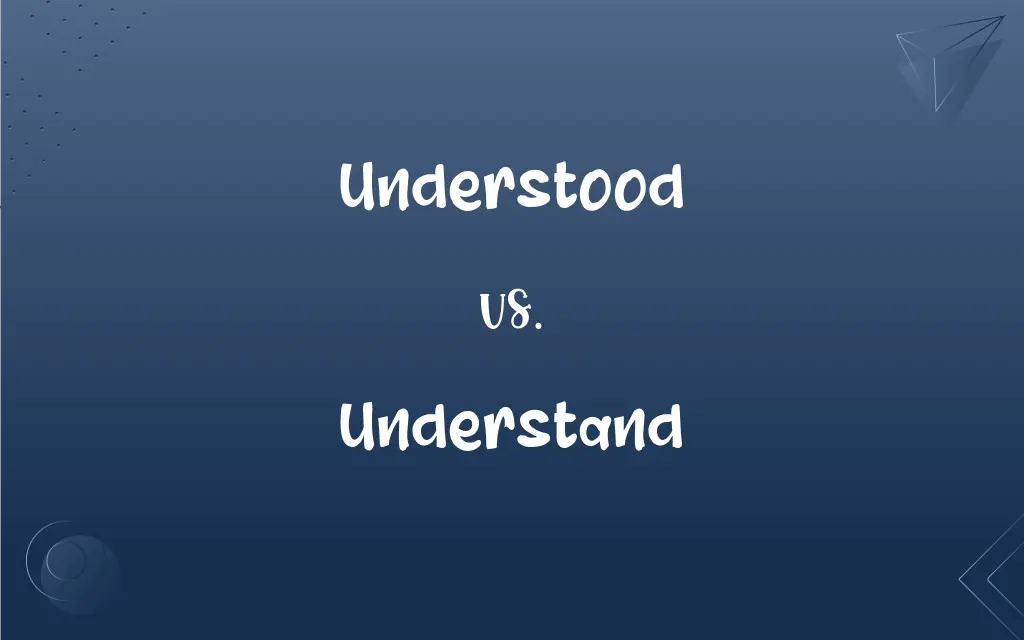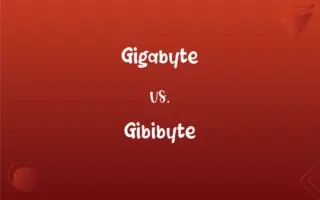Understood vs. Understand: What's the Difference?
By Janet White & Aimie Carlson || Updated on May 22, 2024
"Understood" is the past tense and past participle of "understand," indicating comprehension has already occurred, while "understand" is the present tense, referring to the act of grasping the meaning or concept currently.

Key Differences
"Understood" signifies that comprehension of something has already taken place. It is used in contexts where the action is completed, such as, "I understood the instructions." In contrast, "understand" is the present tense form, indicating an ongoing or current action. For instance, "I understand the instructions" suggests the speaker is currently grasping the information.
"Understood" can also function as an acknowledgment or agreement in conversations, like saying "understood" to confirm receipt of information or orders. On the other hand, "understand" cannot be used in this way and is more about the process of making sense of information.
When talking about repeated or habitual actions, "understand" is used, as in "I understand the rules of this game." Whereas, "understood" would be incorrect in such continuous contexts, but appropriate for one-time events or realizations, such as "Once I read the manual, I understood everything."
In the context of learning or education, "understand" applies to the current effort of grasping concepts, like "I understand algebra now." Conversely, "understood" refers to the accomplishment of comprehension, as in "I finally understood algebra after many lessons."
"Understood" can also be used in reported speech to convey past understanding, such as "She said she understood the terms." However, "understand" in reported speech indicates present comprehension, like "She says she understands the terms."
ADVERTISEMENT
Comparison Chart
Tense
Past tense and past participle
Present tense
Usage
Indicates completed comprehension
Indicates ongoing comprehension
Contexts
Acknowledgment, past events
Current actions, habitual contexts
Reported Speech
Conveys past understanding
Conveys present understanding
Learning Context
Refers to achieved understanding
Refers to current effort
ADVERTISEMENT
Understood and Understand Definitions
Understood
Known implicitly.
It's understood that guests should RSVP.
Understand
Grasp the meaning of something.
I understand the concept clearly.
Understood
Comprehended previously.
She understood the instructions given yesterday.
Understand
Be aware of the character or nature.
I understand her reasons for leaving.
Understood
Accepted or agreed upon.
It is understood that we will meet at 5 PM.
Understand
Interpret or view in a specific way.
He understands the problem differently.
Understood
Realized or grasped.
I finally understood the joke.
Understand
Accept or believe something as true.
I understand that he will not join us.
Understood
Past tense and past participle of understand.
Understand
To become aware of the nature and significance of; know or comprehend
She understands the difficulty involved.
Understood
Agreed on; assumed
The understood conditions of troop withdrawal.
Understand
To become aware of the intended meaning of (a person or remark, for example)
We understand what they're saying.
We just disagree with it. When he began describing his eccentric theories, we could no longer understand him.
Understood
Not expressed in writing; implied
The understood provisos of a custody agreement.
Understand
To know and be tolerant or sympathetic toward
Hoped that they would understand my complaint.
Understood
Having been comprehended.
Understand
To know thoroughly by close contact or long experience with
That teacher understands children. I understand the basics of car repair.
Understood
Simple past tense and past participle of understand
Understand
To learn indirectly or infer, as from hearsay
I understand his departure was unexpected. Am I to understand you are staying the night?.
Understood
Indicates comprehension on the part of the speaker.
Understand
To assume to be or accept as agreed
It is understood that the fee will be $50.
Understood
Fully apprehended as to purport or meaning or explanation;
The understood conditions of troop withdrawal were clear
Understand
To supply or add (words or a meaning, for example) mentally
A verb is understood at the end of the statement "Yes, let's.".
Understood
Indicated by necessary connotation though not expressed directly;
Gave silent consent
A tacit agreement
The understood provisos of a custody agreement
Understand
To have understanding, knowledge, or comprehension.
Understood
Acknowledged.
Understood, he replied to the command.
Understand
To have sympathy or tolerance
You're upset. I understand.
Understand
To learn something indirectly or secondhand; gather.
Understand
(transitive) To grasp a concept fully in one's mind, especially (of words, statements, art, etc.) to be aware of the meaning of and (of people) to be aware of the intent of.
I'm sorry. I don't understand.
Please try to understand. It's not you, it's me.
Understand
To believe, to think one grasps sufficiently despite potentially incomplete knowledge.
I understand that you have a package for me?
In the imperative mood, the word “you” is usually understood.
Understand
To stand underneath, to support.
Understand
To have just and adequate ideas of; to apprehended the meaning or intention of; to have knowledge of; to comprehend; to know; as, to understand a problem in Euclid; to understand a proposition or a declaration; the court understands the advocate or his argument; to understand the sacred oracles; to understand a nod or a wink.
Speaketh [i. e., speak thou] so plain at this time, I you pray,That we may understande what ye say.
I understand not what you mean by this.
Understood not all was but a show.
A tongue not understanded of the people.
Understand
To be apprised, or have information, of; to learn; to be informed of; to hear; as, I understand that Congress has passed the bill.
Understand
To recognize or hold as being or signifying; to suppose to mean; to interpret; to explain.
The most learned interpreters understood the words of sin, and not of Abel.
Understand
To mean without expressing; to imply tacitly; to take for granted; to assume.
War, then, war,Open or understood, must be resolved.
Understand
To stand under; to support.
Understand
To have the use of the intellectual faculties; to be an intelligent being.
Imparadised in you, in whom aloneI understand, and grow, and see.
Understand
To be informed; to have or receive knowledge.
I came to Jerusalem, and understood of the evil that Eliashib did for Tobiah.
Understand
Know and comprehend the nature or meaning of;
She did not understand her husband
I understand what she means
Understand
Perceive (an idea or situation) mentally;
Now I see!
I just can't see your point
Does she realize how important this decision is?
I don't understand the idea
Understand
Make sense of a language;
She understands French
Can you read Greek?
Understand
Believe to be the case;
I understand you have no previous experience?
Understand
Be understanding of;
You don't need to explain--I understand!
Understand
Perceive the intended meaning.
Do you understand what I am saying?
FAQs
What is the past tense of "understand"?
The past tense of "understand" is "understood."
Can "understand" be used to refer to past events?
No, "understand" refers to current comprehension, while "understood" is used for past events.
What is a synonym for "understand"?
A synonym for "understand" is "comprehend."
How do you use "understand" in a sentence?
e.g., I understand your concerns about the project.
Is "understand" used in reported speech?
Yes, to convey present understanding, e.g., "She says she understands."
Is "understood" used for ongoing actions?
No, "understood" indicates completed actions.
How is "understood" used in conversations?
"Understood" is often used to acknowledge information or instructions.
What does "understood" imply in a command?
It implies acknowledgment and acceptance of the command.
Can "understood" be used for habitual actions?
No, "understood" is for one-time comprehension, not habitual actions.
Can "understand" be used for future actions?
Typically, no; it refers to present comprehension.
How is "understood" different from "understand"?
"Understood" is past tense, while "understand" is present tense.
Can "understand" indicate perception?
Yes, e.g., "I understand the difficulties you face."
Can "understand" refer to beliefs?
Yes, it can imply accepting something as true.
How do you convey current comprehension?
Use "understand" to convey current comprehension.
What is the grammatical role of "understood"?
It acts as a verb in the past tense and past participle form.
What phrase means implicit agreement?
"It is understood" implies implicit agreement.
What does "understood" mean in a formal agreement?
It means accepted or agreed upon, often implicitly.
What does "understood" mean in learning contexts?
It means that comprehension has been achieved.
Is "understood" past or present tense?
"Understood" is past tense.
What form is used for acknowledging a message?
"Understood" is used to acknowledge a message.
About Author
Written by
Janet WhiteJanet White has been an esteemed writer and blogger for Difference Wiki. Holding a Master's degree in Science and Medical Journalism from the prestigious Boston University, she has consistently demonstrated her expertise and passion for her field. When she's not immersed in her work, Janet relishes her time exercising, delving into a good book, and cherishing moments with friends and family.
Co-written by
Aimie CarlsonAimie Carlson, holding a master's degree in English literature, is a fervent English language enthusiast. She lends her writing talents to Difference Wiki, a prominent website that specializes in comparisons, offering readers insightful analyses that both captivate and inform.
































































